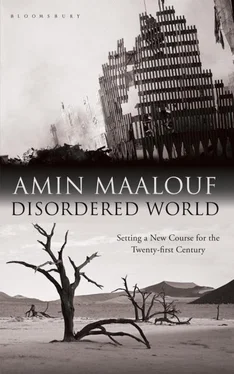But these reservations do not in any way diminish my faith in the exemplary value of the ‘laboratory’ that the creation of Europe represents for humanity at this crucial stage.
A fourth reason for hope occurred in the New World at the start of the amazing year of 2008: the rise of Barack Obama, as a symbol and as a man; the return of a forgotten America, that of Abraham Lincoln, Thomas Jefferson and Benjamin Franklin; in other words, the sudden reawakening of a great nation as a result of its economic crisis and military entanglements.
In response to the only other crisis of similar scale, which began in 1929, Franklin D. Roosevelt launched the New Deal, and it is indeed a new deal which the United States and the whole world need today. But it will have to be broader still and much more ambitious than that of the 1930s. This time it is not just a matter of relaunching the economy and restoring the importance of certain social questions. It is a matter of rebuilding a new global reality, new relations between nations and a new way of working for the planet which will put an end to the disorder in strategy, finance, ethics and climate; and in order for a superpower to commit itself to such a task, it must first recover the legitimacy of its global role.
I have said before that a people recognises itself in leaders who espouse its struggles. I would say the same thing applies at global level. For the world’s nations to accept the primacy of one of their number, they have to be persuaded that that legitimacy is being exercised to their advantage and not at their expense.
Of course, the United States will always have enemies, rivals and even implacable foes who will fight it with all the greater determination if they see the rest of the world rally willingly around it. But the majority of people and leaders in Europe, Africa, Asia and Latin America will judge it on its actions. If it acts on the international stage with subtlety and fairness, if it forces itself to consult other nations respectfully rather than handing down diktats, if it makes it a point of honour to apply to itself first what it demands of others, if it clearly distances itself from immoral practices which have too often sullied its record throughout the world, and if it leads the global mobilisation against the economic crisis, global warming, epidemics, endemic disease, poverty, injustice and discrimination, then its role as first power will be accepted and applauded. Even the use of its military power will not provoke the same reactions of rejection, as long as it does not become a reflex action but remains exceptional and abides by recognisable principles, and is not accompanied with a string of bloody blunders.
More than ever, the world needs America, but an America which is reconciled with the world as well as with itself, an America which exercises its global role with respect for its own values as well as others’ — with integrity, fairness and generosity. I would even add with elegance and grace.
We shall have to wait many years for an adequate evaluation of the true impact of Barack Hussein Obama on the United States and the rest of the world. However, it seems to me that his presence in the White House is not unconnected with the dramatic changes which began in the Arab world in 2011. The fact that these huge protests have, for the first time in decades, been devoid of the least hostility to the United States is due at least in part to the fact that the young president, his personality, African origins, middle name and his subtle choice of the words he uses and avoids using, made the traditional anti-American rhetoric that usually resounds in Arab streets irrelevant and even anachronistic. And it may be that it was the disappearance of this outdated alibi which led the people to attack their own governments, whom they now saw as being truly responsible for their debasement and the first obstacles to demolish on the path to renewal.
I have mentioned some factors that enable us to keep hope alive. But the task to be accomplished is huge and cannot be entrusted to a single leader, however clear-sighted and persuasive he may be, nor to a single nation, however powerful, nor to a single continent.
Because it is not simply a matter of putting in place a new economic and financial model, a new system of international relations, nor only a matter of correcting some obvious types of disorder. It is rather an urgent matter of conceiving an entirely new vision of politics, the economy, work, consumption, science, technology, progress, identity, culture, religion and history, and implanting it in people’s minds; it needs to be an adult vision of what we are, what others are, and the fate of the planet which we all share. In a nutshell, we need to ‘invent’ a conception of the world which is not just the modern version of our ancestral prejudices and which will allow us to ward off the decline that is on the horizon.
All of us who are living through these strange early years of the twenty-first century have the duty — and, more than any preceding generation, the means — to contribute to this rescue effort; with wisdom and lucidity, but also with passion and sometimes even with anger.
Yes, with the burning anger of the righteous.
Adams, Henry, The Education of Henry Adams , Oxford Paperbacks, 2008
Adler, Alexandre, J’ai vu finir le monde ancien , Grasset & Fasquelle, 2002
Albiac, Gabriel, La Synagogue vide , Presses Universitaires de France, 1994
Ansary, Tamim, West of Kabul, East of New York , Picador, 2003
Arendt, Hannah, The Origins of Totalitarianism , André Deutsch, 1986
Armstrong, Karen, The Bible: A Biography , Atlantic, 2007
Barnavi, Élie, Les Religions meurtrières , Flammarion, 2006
Bellati Ceccoli, Guido, L’islam social , Les Trois Anneaux, 2006
Boyle, T. C., The Tortilla Curtain , Bloomsbury, 1996
Bragg, Melvyn, The Adventure of English: The Biography of a Language , Hodder & Stoughton, 2003
Campbell, Greg, Blood Diamonds: Tracing the Path of the World’s Most Precious Stones , Westview Press (US), 2004
Chandrasekaran, Rajiv, Imperial Life in the Emerald City: Inside Baghdad’s Green Zone , Bloomsbury, 2007
Chomsky, Noam, Hegemony or Survival: America’s Quest for Global Dominance , Hamish Hamilton, 2003
Clarke, Richard A., Against All Enemies: Inside America’s War on Terror , The Free Press, 2004
Corm, Georges, La question religieuse au XXIe siècle , La Découverte, 2006
Courbage, Youssef, and Philippe Fargues, Chrétiens et Juifs dans l’Islam arabe et turc , Fayard, 1992
Courbage, Youssef, and Emmanuel Todd, Le rendez-vous des civilisations , Editions du Seuil, 2007
Dalrymple, William, From the Holy Mountain , HarperCollins, 1997
De Botton, Alain, The Consolations of Philosophy , Hamish Hamilton, 2000
Debray, Régis, Un Candide en Terre sainte , Gallimard, 2008
Deltombe, Thomas, L’islam imaginaire. La construction médiatique de l’islamophobie en France, 1975–2005 , La Découverte, 2005
Diamond, Jared, Collapse: How Societies Choose to Fail or Survive , Allen Lane, 2005
Enderlin, Charles, Les années perdues: Intifada et guerres au Proche-Orient 2001–2006 , Fayard, 2006
Engelhard, Philippe, L’homme mondial. Les sociétés humaines peuvent-elles survivre? , Arléa, 1996
Fargues, Philippe, Générations arabes. L’alchimie du nombre , Fayard, 2001
Fernández-Armesto, Felipe, Ideas That Changed the World , Dorling Kindersley, 2003
Fisk, Robert, The Great War for Civilisation: The Conquest of the Middle East , Harper Perennial, 2006
Читать дальше












